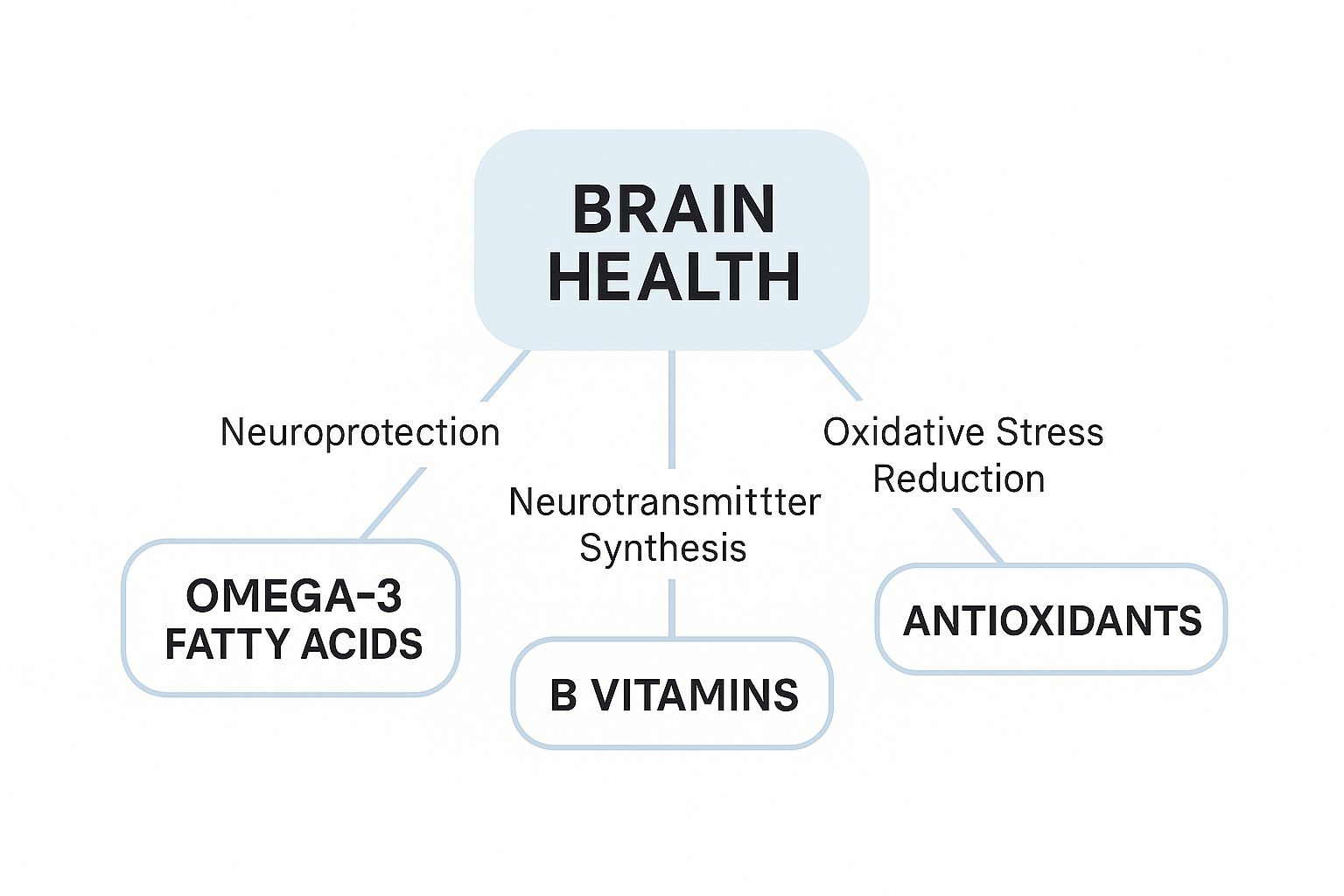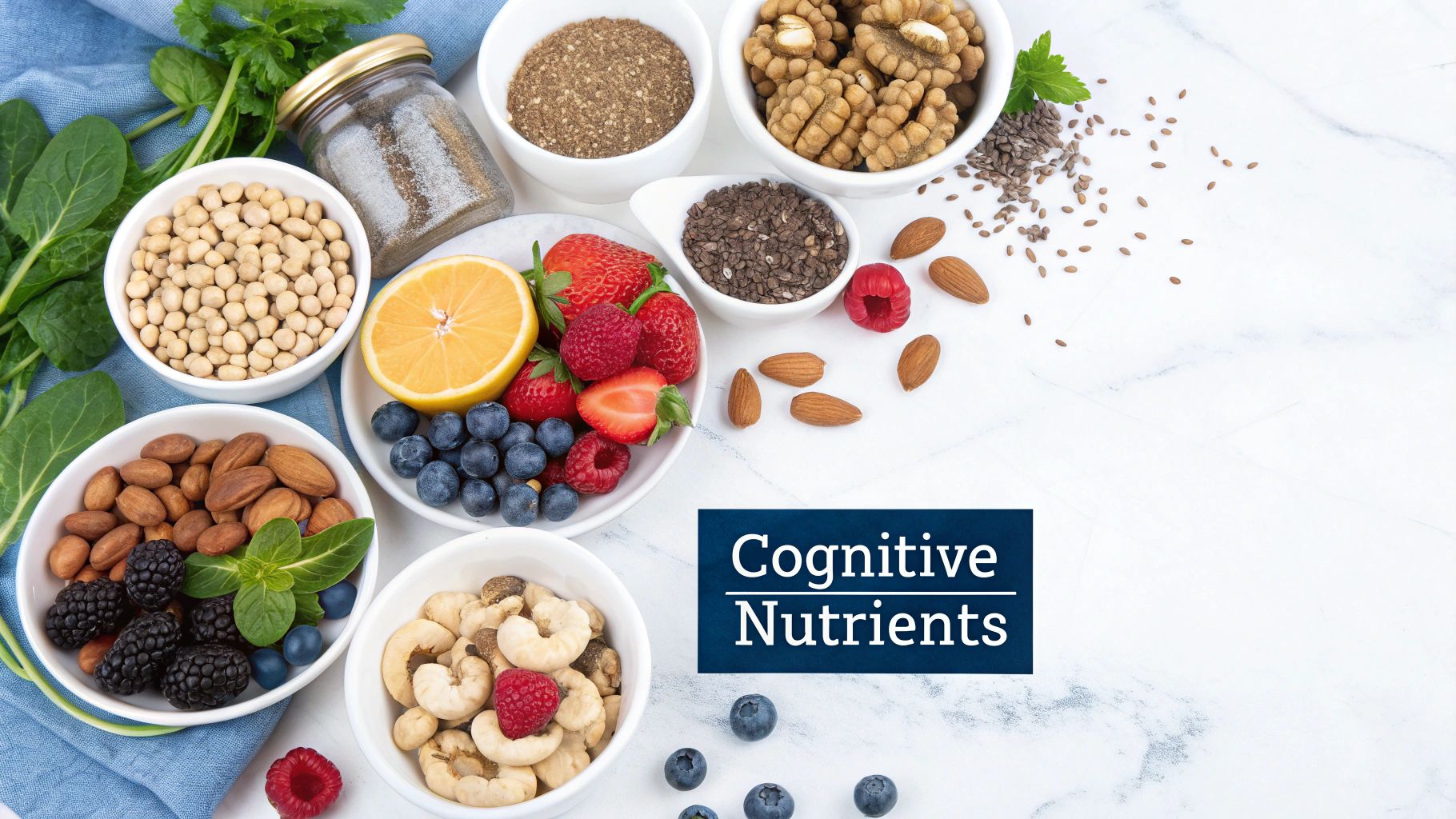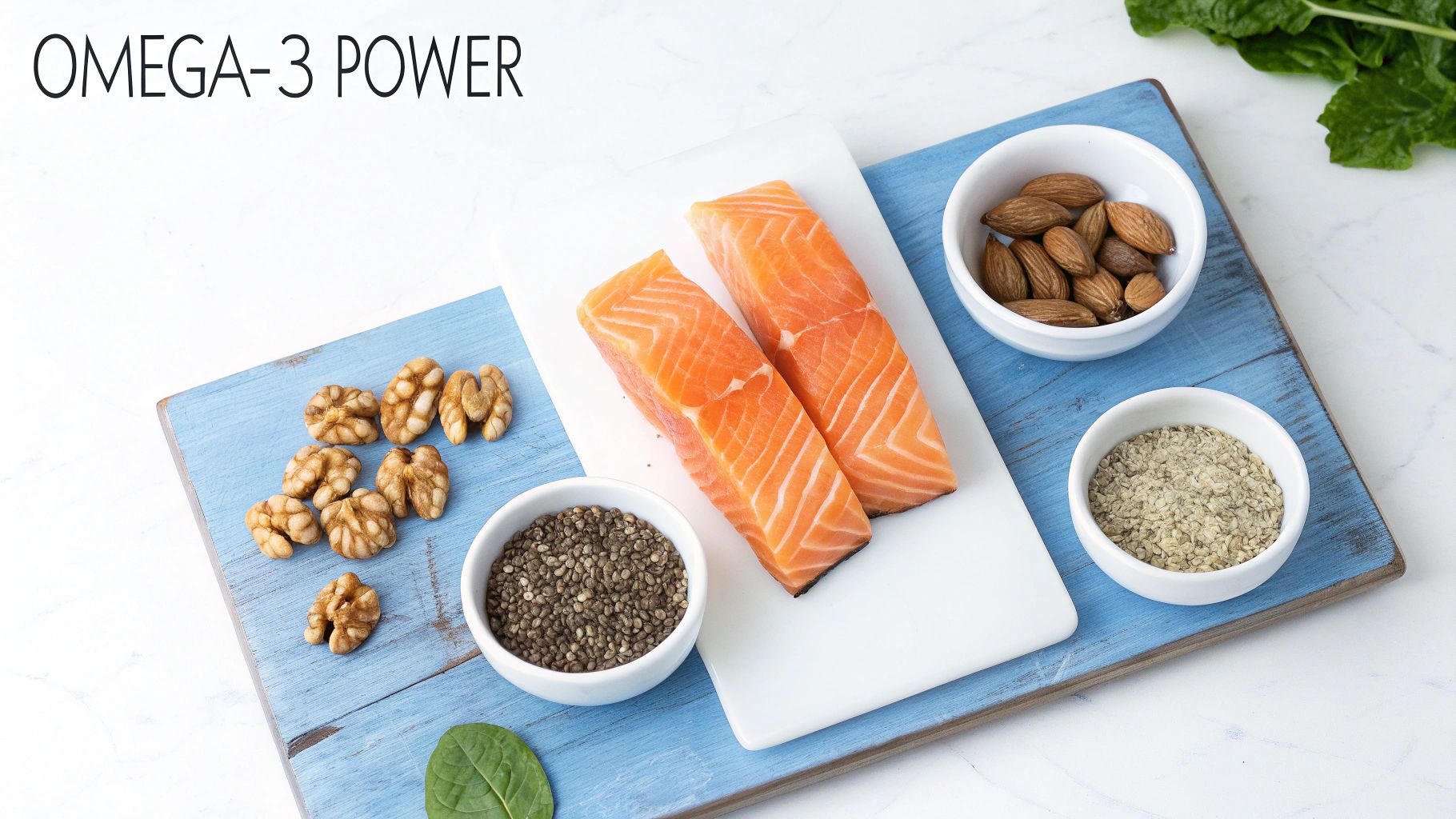How Your Brain Really Uses Food as Fuel
Imagine your brain is the CEO of your entire body. While it's a small part of the whole operation, making up just 2% of your body weight, it's incredibly resource-heavy. This command center consumes a staggering 20% of your daily calories to keep everything running smoothly. But not just any fuel will do. The journey of nutrients from your dinner plate to your brain cells is a carefully managed process that directly impacts your ability to think, learn, and concentrate.
This entire process is controlled by the blood-brain barrier (BBB). Think of it as the ultimate VIP security checkpoint for your brain. It’s a highly selective membrane that meticulously screens everything in your bloodstream, only granting access to the specific nutrients your brain needs to thrive. Understanding this barrier is fundamental to grasping the importance of nutrition for brain health.
The Specialized Roles of Nutrients
Just like a factory has different workers for different jobs, your brain assigns specific roles to the nutrients it receives. Some are builders, some are messengers, and others are part of the maintenance crew.
- Glucose (from carbohydrates): This is your brain's main power source. It requires a constant, steady stream of glucose to fuel everything from basic cell maintenance to complex problem-solving.
- Amino Acids (from protein): These are the essential building blocks for neurotransmitters—the chemical messengers that let your brain cells talk to each other. Without enough of them, signals related to mood, focus, and memory can't be transmitted properly.
- Fats (especially omega-3s): Your brain is composed of nearly 60% fat. Healthy fats, like omega-3 fatty acids, are vital for building and maintaining the cell membranes that ensure quick and clear communication between neurons.
To help you visualize how these nutrients work together as a team, we've put together a quick breakdown of their primary roles.
Essential Brain Nutrients and Their Functions
A comprehensive breakdown of key nutrients, their brain-specific roles, and daily requirements for optimal cognitive function.
| Nutrient | Primary Brain Function | Daily Requirement | Key Benefits |
|---|---|---|---|
| Omega-3s | Building cell membranes, reducing inflammation, supporting brain plasticity | ~250-500 mg (EPA+DHA) | Enhanced memory, mood stability, protection against cognitive decline. |
| Flavonoids | Antioxidant, improving blood flow, reducing inflammation | No set RDA; varies by type | Improved memory and learning, protection against neurodegenerative diseases. |
| Vitamin K | Forming sphingolipids (fat in brain cells), improving memory | Men: 120 mcg Women: 90 mcg |
Enhanced cognitive performance and formation of brain cell membranes. |
| B Vitamins | Energy production, neurotransmitter synthesis, homocysteine regulation | Varies by vitamin (e.g., B12: 2.4 mcg) | Reduced mental fatigue, improved mood, and long-term brain health. |
| Choline | Precursor to acetylcholine, a key neurotransmitter for memory | Men: 550 mg Women: 425 mg |
Sharper memory, improved learning capabilities, and cognitive function. |
This table shows that a variety of nutrients are needed to keep your brain in top shape. It's not about one single "superfood" but about creating a balanced diet that supports the brain's complex needs.
The infographic below further illustrates how this team of nutrients works together to protect, build, and energize your brain.

As the infographic highlights, a symphony of nutrients is required for peak cognitive performance. If you're interested in exploring how different foods contribute to overall wellness, you can find more in our other Cantein nutrition articles.
The Future of Brain Fuel
The connection between our food choices and cognitive vitality is gaining more attention than ever. We're seeing a clear trend toward nutrient-dense, sustainable foods specifically chosen to support long-term brain function. People are now looking for foods grown with a focus on soil health and regenerative agriculture, understanding that these practices can increase the very nutrients our brains depend on. You can discover more insights about 2025 nutrition trends and their impact on our health. This movement makes one thing clear: what’s good for the planet is often what's best for our brains.
Your Gut: The Hidden Command Center of Mental Clarity
It’s a surprising fact, but your digestive system houses more nerve cells than your entire spinal cord. This bustling network, often called the "second brain," is in constant conversation with the brain in your head through a direct line known as the gut-brain axis. This ongoing dialogue isn't small talk; it plays a huge role in whether you feel sharp and on top of your game or foggy and anxious.

This connection is why a "gut feeling" before a big meeting feels so real—it's based on a complex biological signal. The trillions of microbes living in your gut are like tiny chemists, creating a large amount of your body's neurotransmitters. In fact, research shows that these gut bacteria produce around 95% of your body's serotonin, the famous chemical that governs mood, happiness, and a sense of calm.
Feeding Your Inner Ecosystem for a Sharper Mind
A powerful way to boost your cognitive function is to properly nourish these helpful gut microbes. A healthy gut microbiome—the community of bacteria and other microorganisms in your digestive system—depends on certain foods to thrive. This is a foundational principle of nutrition for brain health.
To keep this internal ecosystem balanced, try adding these foods to your regular meals:
- Probiotic-Rich Foods: These act like reinforcements, delivering beneficial bacteria directly into your system. Think of them as new recruits for your gut’s internal army. Great sources include yogurt with live active cultures, kefir, sauerkraut, and kimchi.
- Prebiotic-Rich Foods: These are special types of fiber that your gut bacteria eat. Essentially, they are the fuel that helps your good bacteria grow and flourish. You can find them in foods like garlic, onions, bananas, oats, and asparagus.
Given the strong link between the gut and brain, it makes sense to look at foods that specifically aid digestive wellness. For instance, you can learn more about olive oil's science-backed benefits for digestion and gut health.
This approach to health is gaining significant attention. The growing awareness of the gut-brain axis has made personalized nutrition a key part of modern wellness, with gut health seen as a direct path to mental well-being. This shift goes hand-in-hand with a greater focus on clean eating and food safety policies to reduce exposure to toxins that could harm brain function. As more people understand this connection, taking care of the gut is becoming a central part of proactive brain care. You can read more on this trend toward cognitive wellness. By choosing gut-friendly foods, you're not just improving digestion; you are actively fine-tuning your mind for better clarity and performance.
Brain-Boosting Foods That Actually Work
Forget the notion that a sharper mind only comes from a pill bottle. Your everyday grocery store is packed with powerful, research-supported foods that contribute to long-term nutrition for brain health. While there's no single "magic" food, a consistent diet rich in specific nutrients can make a noticeable difference in your mental clarity and mood. These foods provide the essential building blocks your brain requires to form stronger connections, defend against damage, and run at peak efficiency.
The foods listed below are some of the most effective for cognitive performance and are cornerstones of eating patterns like the Mediterranean diet.

This image shows the variety of whole foods that are widely praised for their brain benefits, including fatty fish, nuts, and vibrant fruits and vegetables. The main point is that a brain-healthy plate is colorful and diverse, focusing on unprocessed ingredients that work in synergy to support your cognitive well-being.
Key Players in Brain Nutrition
Understanding why certain foods are so good for your brain makes it easier to build healthy habits that stick. Here are some of the top contenders and the science that makes them so valuable.
-
Fatty Fish: Think of omega-3 fatty acids as the primary construction material for your brain. Your brain is nearly 60% fat, and these essential fatty acids are crucial for building and repairing brain cell membranes. Strong, flexible membranes mean faster and clearer communication between your neurons. Aim for two servings a week of fish like salmon, mackerel, and sardines. You can also explore the advantages of plant-based sources; for instance, learn more about the benefits of omega-3 and 6 in hemp seed in our detailed guide.
-
Berries and Dark Leafy Greens: These foods are loaded with antioxidants, especially compounds called flavonoids. Picture antioxidants as your brain's dedicated security detail, neutralizing rogue molecules called free radicals that cause cellular stress and damage. Studies consistently link regular consumption of these foods to a slower rate of age-related cognitive decline.
-
Nuts and Seeds: Walnuts, flaxseeds, and chia seeds are fantastic plant-based sources of both omega-3s and antioxidants. They deliver a powerful one-two punch of structural support and protection for your brain cells. A small handful is a perfect, easy snack for a mental boost.
-
Turmeric: The bright yellow spice contains an active compound called curcumin, which is a potent anti-inflammatory agent. Chronic inflammation is tied to many cognitive issues, particularly as we age. Adding turmeric to your meals can help offer long-term protection for your brain.
The Brain Health Market: What's Worth Your Money
Walking through the health store aisles can feel like a pop quiz for your brain, with countless bottles promising to sharpen focus and boost memory. The brain health supplement industry is a massive, rapidly growing field, driven by our collective desire for mental clarity in a demanding world.
This market isn't just big; it's expanding at an incredible pace. In 2024, the global market for brain health supplements was valued at about $10.65 billion. It's expected to jump to $11.89 billion by 2025. This surge is powered by trends like personalized nutrition and a greater public understanding of how our daily habits impact brain function. You can read the full market analysis here to see the forces behind this growth.
With so much money on the line, it's crucial to tell the difference between products grounded in real science and those riding a wave of clever marketing. The sheer number of choices makes it tough to figure out what truly supports your nutrition for brain health goals.
Decoding the Labels: Science vs. Hype
When you pick up a supplement, your first move should be to flip it over and ignore the flashy promises on the front. Look directly at the ingredients list. Many products use a “proprietary blend,” which is a tactic that hides the exact amount of each ingredient. This should be a major red flag. Without knowing the dosage, you can't tell if you're getting enough of an ingredient to actually make a difference.
Instead, search for products that are transparent, clearly listing every active ingredient and its specific dose. This empowers you to check those amounts against published scientific studies. If you're curious about what works, our breakdown of the top supplements for focus and concentration in 2025 examines the evidence behind popular ingredients like L-theanine, bacopa monnieri, and creatine.
A Food-First Approach Is Still Best
While specific supplements can help fill nutritional gaps, they can't replace a genuinely healthy diet. Think of it this way: you can't build a strong house on a weak foundation. The World Health Organization (WHO) confirms that the most solid evidence for preventing cognitive decline points to lifestyle choices, not pills.
A diet centered on plant-based foods—full of fruits, vegetables, and whole grains—gives your brain a complex network of vitamins, minerals, and antioxidants that work together. No single supplement can replicate the synergistic benefits of whole foods. The smartest strategy is to build that strong foundation with a nutritious diet first. Only then should you consider supplements to target specific, known needs, not as your primary line of defense.
Smart Food Choices for Everyday Cognitive Enhancement
What if your morning meal could sharpen your memory, or your afternoon snack could bring your focus into crystal-clear view? This isn’t a far-off idea; it’s the reality of functional foods. These are everyday items, like eggs or yogurt, that have been enriched with compounds that support the brain, making it simple to nourish your mind. As more people look for ways to boost their mental performance through diet, food companies are introducing new options designed to fit right into our daily lives.

This growing interest is no small trend. In 2024, the global market for functional foods and drinks aimed at brain health was valued at approximately $19.6 billion, with North America leading consumption. While this gives us more choices than ever, it also presents a challenge: how do you tell which products genuinely deliver and which are just clever marketing? The key is to become an informed shopper who knows what to look for on the label. You can discover more insights about the brain health food market to understand its rapid growth.
Navigating the Grocery Aisles
To make better choices, it helps to see how familiar foods are being upgraded to support brain function. Think of these as strategic swaps in your grocery cart—turning a simple meal into a powerful opportunity for cognitive wellness.
To better illustrate how these functional foods stack up against their standard counterparts, the table below offers a direct comparison.
Functional Foods vs. Traditional Foods: Brain Health Comparison Side-by-side comparison showing how functional foods enhance brain health benefits compared to their traditional counterparts
| Food Category | Traditional Option | Functional Alternative | Added Brain Benefits | Cost Difference |
|---|---|---|---|---|
| Eggs | Standard Eggs | Omega-3 Enriched Eggs | Higher levels of DHA, crucial for neuron structure and reducing inflammation. | +$2 to $4 per dozen |
| Yogurt | Plain Yogurt | Probiotic Yogurt/Kefir | Contains specific bacterial strains (e.g., L. helveticus) linked to improved mood and lower stress via the gut-brain axis. | +$1 to $3 per container |
| Plant Milk | Standard Almond Milk | Fortified Oat or Soy Milk | Enriched with Vitamin B12 for nerve function and Vitamin D for neuroprotection. | +$1 to $2 per half-gallon |
| Cereals | Sugary Breakfast Cereal | Nutrient-Dense Whole Grain Cereal | Fortified with magnesium for energy metabolism and fiber for sustained glucose release to the brain. | +$2 to $3 per box |
As the table shows, a small increase in cost often comes with a significant boost in brain-supporting nutrients. These functional alternatives are designed for convenience, allowing you to improve your diet without a complete overhaul.
Here’s a closer look at what to look for:
- Omega-3 Enriched Eggs: Standard eggs are a good source of choline, but these functional versions come from hens fed a diet rich in flaxseed, which supercharges their omega-3 content. This gives you two vital brain nutrients in one easy-to-prepare food.
- Probiotic Yogurts and Kefirs: These products go beyond basic yogurt by including specific probiotic strains that have been studied for their positive effect on the gut-brain axis, potentially helping to regulate mood and reduce stress.
- Fortified Plant Milks: Many almond, soy, and oat milks are now strengthened with essentials like Vitamin B12 and Vitamin D. This makes them a great option for everyone, but especially for those following plant-based diets who might miss these nutrients.
- Nutrient-Dense Bars and Cereals: Look for breakfast items and snacks that are specifically enriched with magnesium, fiber, and plant-based proteins. These ingredients work together to provide sustained energy and the building blocks for neurotransmitters.
By learning to spot these enhanced foods, you can integrate effective nutrition for brain health into your routine. It’s not about dramatic changes, but about making small, smart swaps that accumulate into major cognitive advantages over time.
Making Brain-Healthy Eating Actually Happen
It’s one thing to know which foods boost your brainpower, but it's a completely different challenge to consistently eat them, especially when life gets busy. The distance between knowing and doing can feel massive. The good news is you don’t have to become a gourmet chef or spend hours in the kitchen to make nutrition for brain health a part of your daily life.
The secret is to create a system that simplifies healthy choices. Think of it as setting up your kitchen for guaranteed success. By stocking your pantry and fridge with the right ingredients, you make the brain-healthy option the easiest one. This is most important during stressful moments when your brain needs that nutritional support the most.
Stocking Your Kitchen for Cognitive Success
A well-stocked kitchen is your greatest ally against making poor food choices at the last minute. The goal is to have versatile, long-lasting staples on hand that can form the foundation of countless brain-friendly meals.
- Pantry Powerhouses: Keep your cupboards filled with whole grains like oats and quinoa, legumes like lentils and chickpeas, and a variety of nuts and seeds. These provide a steady supply of fiber, protein, and healthy fats.
- Freezer Essentials: Frozen berries, leafy greens like spinach, and edamame are just as nutritious as their fresh counterparts. They're perfect for smoothies or quick veggie side dishes. Stashing portions of fatty fish like salmon in the freezer also makes for an easy weeknight dinner.
- Flavor Foundations: A great collection of herbs and spices, like turmeric and rosemary, can add potent anti-inflammatory compounds to any dish without extra calories. You can even explore practical guides on cultivating brain-healthy herbs and teas to grow your own.
Practical Meal Prep That Actually Works
Meal prepping doesn't have to mean spending your entire Sunday packing identical meals into a row of containers. A more flexible method called batch-cooking is often much more sustainable. This approach involves preparing individual ingredients in large amounts that you can mix and match all week. For instance, you could cook a big pot of quinoa, roast a tray of mixed vegetables, and grill some plant-based protein.
With these building blocks ready, your meals come together in minutes. You can create a quinoa bowl one day, a loaded salad the next, and a veggie-packed stir-fry later on. This method gives you structure without the boredom, making it far easier to stick with your healthy eating goals. It’s an adaptable system that fits your schedule and cravings, making a brain-healthy diet a natural part of your life.
Your Personal Brain Nutrition Roadmap
Turning your knowledge of nutrition for brain health into a daily habit is where the real work—and the real reward—truly begins. Building a personal plan isn't about aiming for perfection from day one. It's about creating a sustainable system that fits your unique lifestyle. This blueprint is designed to help you go from just knowing what to eat to confidently fueling your brain every single day.
Imagine you're navigating with a map. Before you can plot a course to your destination, you first need to know exactly where you're standing right now.
Step 1: Assess Your Current Eating Habits
Take one week to keep a simple food journal. The goal here isn't to judge yourself or make changes just yet—it's purely about observation. Jot down what you eat and when. At the end of the week, take a look at the bigger picture.
- Identify Opportunities: Where are the most obvious gaps? Are you consistently missing out on leafy greens or healthy fats? Do you find yourself reaching for processed snacks in the afternoon?
- Recognize Your Wins: What are you already doing well? Maybe you never skip a protein-rich breakfast or you always drink plenty of water. Give yourself credit for these successes.
Step 2: Set Realistic, Actionable Goals
With your starting point clear, pick just one or two small, specific changes to make. Setting goals that are too big or too broad can quickly lead to feeling overwhelmed. Instead, the key is to build momentum through small victories.
- A Vague Goal: "I will eat healthier." (This is hard to measure and easy to abandon.)
- A Great Goal: "I will add a handful of spinach to my smoothie three times this week." (This is specific, measurable, and achievable.)
This approach creates small, repeatable wins that build your confidence. Once one habit feels automatic, you can easily add another.
Step 3: Track and Adjust
Your body provides the best feedback you can get. Start paying close attention to how you feel. Are you noticing less brain fog in the afternoon? Is your focus a bit sharper during important tasks? These feelings are important metrics of your success.
If a certain strategy isn't clicking—maybe you really dislike a specific food—don’t force it. The world is full of brain-healthy options. The goal is to find what you genuinely enjoy and what makes you feel your best, then adapt your plan as you go.
This isn’t a rigid, all-or-nothing diet; it’s a flexible framework for lifelong cognitive well-being. To make these changes even easier, think about integrating a clean, plant-based protein into your routine. Cantein is formulated to give your brain the high-quality fuel it needs, fitting perfectly into the healthy habits you’re building. Discover the benefits of Cantein for your personal nutrition plan and take the next step on your journey.

